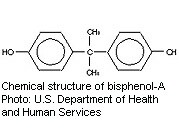healthnewslink
Women's Newsletter
October 8, 2012 |
| In this Issue |
|
|
|
Survivor of Aggressive Breast Cancer Stresses Need for Quick Action
'Listen to your body,' woman urges, to fight off inflammatory breast cancer
 FRIDAY, Oct. 5 (HealthDay News) -- Margaret Zuccotti was nursing her third child in August of 2006 when she noticed that her breast was red, swollen and tender to the touch. Because she'd had other children, she chalked up her symptoms to a simple breast infection, and her doctor agreed.
What she thought was an infection cleared up a bit after a course of antibiotics, but it didn't go away completely. Still, with three kids to tend to, Zuccotti nearly forgot about her symptoms. But in early September, she felt a lump in her breast. Although she still thought this was an infection or another nursing-related issue, she went to see her obstetrician.
"I could tell right away that there was concern," she recalled. "They asked me to stay so that I could have an ultrasound, and then a mammogram. They told me there was a mass there, but they didn't know what it was. They told me to go see a surgeon as soon as possible."
Zuccotti remembers being surprised by their concern. "I was just 37," she said. "I am the youngest of five girls. We have no family history of breast cancers."
The surgeon immediately confirmed the breast cancer diagnosis just from the exam, though he also did a fine-needle biopsy. Further tests revealed a spot on Zuccotti's skull and multiple spots on her liver, she said.
Her treatment at Fox Chase Cancer Center in Philadelphia involved seven months of weekly chemotherapy with the drugs Taxol and Herceptin. Then she was switched to Herceptin only, a drug she said she still gets every three weeks.
"Taxol is tough on your system," Zuccotti said. "I did lose my hair, and I didn't feel great, but I was able to move around and do a light jog sometimes. I needed to get some extra help, but it was manageable."
She said she had a mastectomy in August 2010 "because I wanted to know that I had done everything I could have done." She also gets scans once a year now to make sure the cancer hasn't come back.
She said that though her doctors won't make promises, they're hopefully optimistic. "I consider myself very lucky," Zuccotti said.
"When things hurt a little or are sore, people who've had cancer, worry," she said. "It may just be an age thing, but I become terribly frightened when I have new symptoms."
Of course, given that she runs four to five miles a couple of times a week, chances are good that Zuccotti may have some aches and pains. But, she said, she believes that keeping active has "had a positive impact on my survival."
Her advice to other women? "Listen to your body," she said. "I'm glad I acted and got to the doctor." Too often, she said, women put off going to the doctor because they're taking care of everyone else or, if they've found a lump, because they're scared of what the doctor might tell them. But the sooner you get diagnosed, she said, the better your chances of survival.
"There are no guarantees, but I believe the more you know, the better you'll do," Zuccotti said. "Stay informed. Stay active. Stay hopeful."
More information
A companion article offers more information on inflammatory breast cancer  . .

|
BPA Exposure Impacts Pregnant Women's Thyroids, Study Suggests
Widely used chemical linked to lower levels of hormone in newborn boys, but not girls
 THURSDAY, Oct. 4 (HealthDay News) -- New research finds that BPA -- a chemical widely used in the manufacture of hard plastics, cans and even store receipts -- is associated with lower levels of thyroid hormone in both pregnant women and their newborn boys.
At this point, the implications of the findings to human health are unclear, although abnormal thyroid hormone levels have been associated with changes in thinking skills, behavior and growth, according to the research, which was published online Oct. 4 in Environmental Health Perspectives.
This is the first study to show an association between BPA (or bisphenol A) and thyroid hormone in pregnant women, according to the study's lead author, Kim Harley, an adjunct associate professor of public health at the University of California, Berkeley.
Almost all -- 95 percent -- of women of reproductive age have enough BPA in their urine to be detectable. BPA has also been found in placental tissue and amniotic fluid and is known to have estrogen-like activity.
There has been concern that BPA may be linked with reproductive and developmental problems and, in July, the U.S. Food and Drug Administration banned BPA in baby bottles and sippy cups.
In the new study, researchers measured BPA levels in the urine of 335 pregnant women, once during the first half of pregnancy and once in the second half.
They also measured levels of thyroid hormones in the women and their newborn babies.
Although thyroid hormone levels fell within a normal range, higher levels of BPA exposure were associated with lower thyroid levels in both mothers and newborn boys, though not girls, the investigators found.
It's not clear why the gender difference but one hypothesis, Harley said, "is that boys may be less able to detoxify BPA than girls."
The hormone changes seen in the mothers weren't overly dramatic, but the exposure to the fetus could be another story entirely, an expert suggests.
"We have increasing concern about endocrine-disrupting chemicals," said Dr. Keith Cryar, an endocrinologist with Scott & White in Temple and in Round Rock, Texas. "We know that very small differences can sometimes have profound effects on the developing fetus."
The researchers also found that the effects of BPA on thyroid hormone were transient.
"It's good news in the sense that, if we were able to stop exposure to BPA, there might not be a long-term effect on the human body," said another lead author, Jonathan Chevrier, a research epidemiologist at UC Berkeley's Center for Environmental Research and Children's Health. "On the other hand, what we're experiencing right now is that people are being continuously exposed to BPA so it's not necessarily good news in the present state of things."
Because the study was limited to poor immigrant Mexican-American women and their babies, the authors pointed out that the findings cannot necessarily be generalized to other populations.
Nor can the study prove that BPA causes declines in thyroid hormone levels.
But the findings do provide some revelations about BPA.
"BPA has gotten a lot of attention for being an estrogen, but it's more complicated than that," Harley said. "We know from laboratory studies that it interferes with other hormones, including thyroid hormone."
The findings, said Robin Dodson, a research scientist with the Silent Spring Institute in Newton, Mass., "are important to understand the health effects of BPA."
And the good news is that there are ways to limit exposure to BPA, including adding fresh foods to your diet while avoiding packaged foods, Dodson added.
Harley said this is the first of several studies on BPA scheduled to come out in the coming months. The next two studies will look at the effects of BPA on neurodevelopment in children and on obesity.
More information
For more on BPA, visit the Mayo Clinic  . .

|
Hormone Therapy in Early Menopause May Benefit Some Women: Study
Small trial found no harm to heart, memory; some experts remain unconvinced
 WEDNESDAY, Oct. 3 (HealthDay News) -- New research suggests that hormone replacement therapy, used to relieve hot flashes and other symptoms of menopause, might be safe for younger menopausal women when taken in smaller doses for short periods of time.
Women have shied away from this type of therapy since the landmark Women's Health Initiative study found elevated risks of breast cancer, heart disease and other health problems among women taking estrogen plus progestin, a synthetic form of progesterone. That study was halted early because of the results, published in 2002.
But research scheduled for presentation Wednesday at the annual meeting of the North American Menopause Society in Orlando, Fla., found that estrogen, either in oral form (Premarin) or as a patch (Climara), plus a progesterone (Prometrium) did not harm the heart either in terms of raised blood pressure or hardening of the arteries.
Progesterone is added because estrogen alone can promote uterine cancer.
In another part of the study, hormone replacement therapy did help with mood and depression, researchers from the University of Wisconsin School of Medicine and Public Health found. It did not worsen memory, as the Women's Health Initiative had indicated, the researchers said in a university news release.
The roughly 700 women participating in the study were age 53, on average, and within three years of menopause -- the time when periods stop. This was much younger than the average age of women participating in the Women's Health Initiative, many of whom were taking hormone therapy in the hope of staving off some of the problems of old age, such as heart disease.
The new study, funded by the Phoenix-based Kronos Longevity Research Institute, was too small to assess any effect on breast cancer rates, one of the main concerns of women considering hormone replacement therapy.
Some experts remain unconvinced by these latest findings. Among them is Dr. Jay Brooks, chairman of hematology/oncology at Ochsner Health System in Baton Rouge, La.
"I still say the bottom line is if you don't need to take [hormone replacement therapy], don't take it," Brooks said.
"The largest study to date of estrogen plus progestin [the Women's Health Initiative] showed an increased risk of heart disease and breast cancer and stroke, so if your symptoms are so severe you need to take it, understand there's a risk," he added. "And take as low a dose as possible for as short a time as possible."
Dr. Jennifer Wu, an obstetrician/gynecologist at Lenox Hill Hospital in New York City, also expressed caution.
"We've gone back and forth on how safe hormones are and this is just one study," she said. "It only looks at early menopause and it's only looking at hardening of the arteries. It didn't look at breast cancer, which is also a very big concern."
Before she could wholeheartedly encourage patients to take hormone replacement therapy in early menopause, Wu said she would like to see more studies on breast cancer. "We may not catch breast cancer in four years, though it may develop," she noted.
The new results reaffirm conclusions released in July by a coalition of 15 leading medical groups, including the North American Menopause Society, that hormone replacement therapy can be useful and safe for many women suffering from symptoms of menopause such as hot flashes and night sweats.
That statement said that hormone therapy is an acceptable choice for relatively young (up to age 59 or within 10 years of menopause) and healthy women who are bothered by moderate-to-severe menopausal symptoms.
According to that statement, hormone replacement therapy increases the risk for blood clots in the legs and lungs, although this risk is rare in women 50 to 59 years old. Its use should be decided on a case-by-case basis, the statement authors said.
Breast cancer risk appears to increase when hormone replacement therapy is taken continuously for five years -- and possibly less. The risk declines when hormone replacement therapy is stopped, the coalition said.
The data and conclusions of research presented at medical meetings should be considered preliminary until published in a peer-reviewed medical journal.
More information
The U.S. National Library of Medicine has more on hormone replacement therapy.

|
| Copyright © 2012 ScoutNews, LLC. All rights reserved. |
|